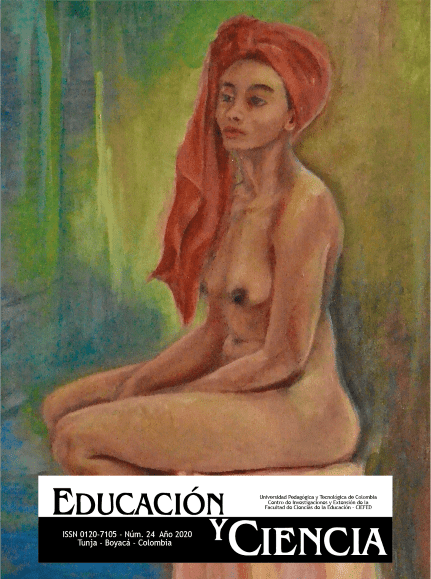Examining the Teacher Practice in Musical Education

Abstract
The Pedagogical Content Knowledge (PCK) is a concept that explains how the teacher transforms his own knowledge on the subject into understandable material for students. To address it, Park and Oliver propose a model of six components that interact in a predefined context. Aim of this research was to make explicit the PCK of a guitar specialist teacher during a plucked string class in 2018, at private school in Tunja (Boyacá). For this, the hexagonal model proposed by Park and Oliver was used based on a case study where the planning and recording of a class is analyzed, as well as an interview with the teacher. The results show that the teacher’s PCK is based on the practical knowledge of the instrument and the students, the representations and beliefs about the class and, the constant evaluation. In this way, the subject proposes to develop the understanding of the explained concepts, through instrumental execution that, at the same time, serves as a strategy and way of evaluating students
Keywords
Pedagogical Content Knowledge, Pedagogy, Music Education, Music Teacher Education, String Teacher
References
Astolfi, J. P. (2001). Conceptos clave en la didáctica de las disciplinas. Díada.
Ball, D. L., Thames, M. H., & Phelps, G. (2008). Content knowledge for teaching: What makes it special. Journal of teacher education, 59(5), 389-407. https://doi.org/10.1177/0022487108324554
Ballantyne, J., & Packer, J. (2004). Effectiveness of preservice music teacher education programs: Perceptions of early-career music teachers. Music Education Research, 6(3), 299-312. https://doi.org/10.1080/1461380042000281749
Bolívar, A. (2005). Conocimiento didáctico del contenido y didácticas específicas. Profesorado. Revista de currículum y formación del profesorado, 9(2), 1-39.
Camilloni, A., Cols, E., Basabe, L., & Fenney, S. (2007). El Saber Didáctico. Paidós.
Conway, C. M. (1999). The development of teaching cases for instrumental music methods courses. Journal of Research in Music Education, 47(4), 343–356. https://doi.org/10.2307/3345489
Freer, P. K. (2018). Research-to-Resource: Initial Steps in Vocal Technique for Boys Experiencing Difficulty With Phonation During the Adolescent Voice Change. Update: Applications of Research in Music Education, 37(1), 9–12. https://doi.org/10.1177/8755123318779880
Hemsy de Gainza, V. (2003). La educación musical entre dos siglos: del modelo metodológico a los nuevos paradigmas. (Documento de trabajo N°10). Universidad de San Andrés. http//hdl.handle.met/10908/773
Glise, A. L. (1997). Classical guitar pedagogy. a handbook for teachers. Mel Bay Publications.
Grieser, D., & Hendricks, K. (2018a). Pedagogical Content Knowledge for Shifting: More than a Toolbox of Tricks. American String Teacher, 68(2), 16–19. https://doi.org/10.1177/0003131318760822
Grieser, D., & Hendricks, K. (2018b). Review of Literature: Pedagogical Content Knowledge and String Teacher Preparation. Update: Applications of Research in Music Education, 37(1), 13–19. https://doi.org/10.1177/8755123318760970
Grossman, L. P., Wilson, S. M., & Shulman, L. S. (2005). Profesores de sustancia: el conocimiento de la materia para la enseñanza (P. V. Rodríguez, Trad.). Profesorado, Revista de currículum y formación del profesorado, 9(2), 1-25. (Trabajo original publicado en 1989) https://recyt.fecyt.es/index.php/profesorado/article/view/42676
Haston, W., & Leon-Guerrero, A. (2008). Sources of Pedagogical Content Knowledge Reports by Preservice Instrumental Music Teacher. Journal of Music Teacher Education 17(2), 48-59. https://doi.org/10.1177/1057083708317644
Hernández, R., Fernández, C., & Baptista M. (2014). Metodología de la investigación (6a ed.). McGraw-Hill
Martínez, G. (2016). Estado del arte de la didáctica de la música desde una revisión de la revista Eufonía en los años 2014, 2015 [Trabajo de grado de especialización, Universidad Pedagógica Nacional]. https://goo.gl/YTUdPE
Millican, J. S. (2013). Describing Instrumental Music Teachers’ Thinking: Implications for Understanding Pedagogical Content Knowledge. Update: Applications Of Research In Music Education, 31(2), 45-53. https://doi.org/10.1177/8755123312473761
Millican, J. S. (2016). Describing Preservice Instrumental Music Educators’ Pedagogical Content Knowledge. Update: Applications of Research in Music Education, 34(2), 61–68. https://doi.org/10.1177/8755123314552664
Millican, J. S. (2017). Examining Pedagogical Content Knowledge of an Expert Band Director Teaching Lips Slurs. Journal of Music Teacher Education, 26(2), 90–103. https://doi.org/10.1177/1057083716629610
Ministerio de Educación Nacional. (2010). Orientaciones pedagógicas para la educación artística en básica y Media. (Documento N° 16). https://www.mineducacion.gov.co/1759/articles-241907_archivo_pdf_orientaciones_artes.pdf
Ministerio de Educación Nacional. (2008). IV encuentro Nacional de Educación Artística: Lugares y sentidos del arte en la educación en Colombia (Relatorías finales). MEN.
Ministerio de Educación Nacional. (2000). Lineamientos curriculares de educación artística (Serie de lineamientos curriculares, educación artística) https://www.mineducacion.gov.co/1621/articles-339975_recurso_4.pdf
Park, S., & Oliver, J. S. (2008). Revisiting the conceptualization of pedagogical content knowledge (PCK): PCK as a conceptual tool to understand teachers as professionals. Research in Science Education, 38(3), 261-284. https://doi.org/10.1007/s11165-009-9163-8
Rojas, G. A. (2019). Conocimiento didáctico del contenido como técnica interpretativa de una práctica docente musical. Estudios Artísticos, 5(7), 209-225. https://doi.org/10.14483/25009311.14989
Schiemann, S. (2017). Generalist and specialist primary music teachers’ uses of nonverbal and verbal support during music practice. Psychomusicology: Music, Mind, and Brain, 27(3), 180-190. https://doi.org/10.1037/pmu0000189
Shulman, L. S. (1986). Those Who Understand: Knowledge Growth in Teaching. Educational Researcher, 15(2), 4–14. https://doi.org/10.3102/0013189X015002004
Shulman, L. S. (1987). Knowledge and Teaching: Foundations of the New Reform. Harvard Educational Review 57(1), 1-23. https://doi.org/10.17763/haer.57.1.j463w79r56455411
Sloboda, J. A. (2000). Individual Differences in Music Performance. Trends in Cognitive Sciences, 4(10), 397-403. https://doi.org/10.1016/S1364-6613(00)01531-X
Stake, R. E. (1999). Investigación con Estudio de Casos. Morata
Strauss, A., & Corbin, J. (2002). Bases de la investigación cualitativa. Técnicas y procedimientos para desarrollar la teoría fundamentada (E. Zimmerman, trad.; 1a ed.). Colombia: Editorial Universidad de Antioquia.
Vásquez, C. M. (2017). Entre Cuerdas de Guitarra. PNMC. https://cutt.ly/sdR7hk6
Young, V., Burwell, K., & Pickup, D. (2003). Areas of Study and Teaching Strategies in Instrumental Teaching: a case study research project. Music Education Research, 5(2), 139–155. https://doi.org/10.1080/14613800307110
Zambrano, A. (2005). Didáctica, pedagogía y saber. Cooperativa Editorial Magisterio.
Zambrano, A. (2016). Pedagogía y didáctica: esbozo de las diferencias, tensiones y relaciones de dos campos. Praxis & Saber, 7(13), 45-61. https://doi.org/10.19053/22160159.4159
Zingara, J. J. (2004). Cleaning up Trumpet Sound: Some Paths to Better Tone. Teaching Music, 12(3), 42.
